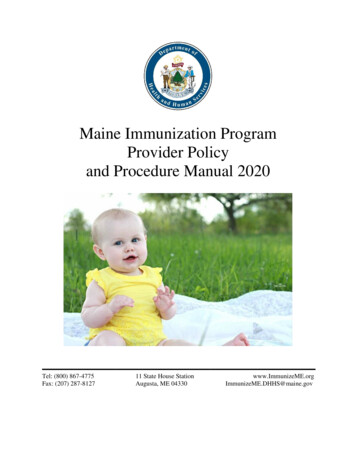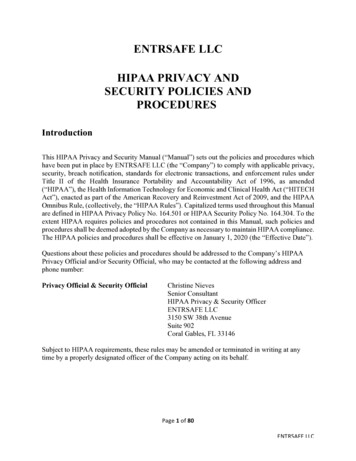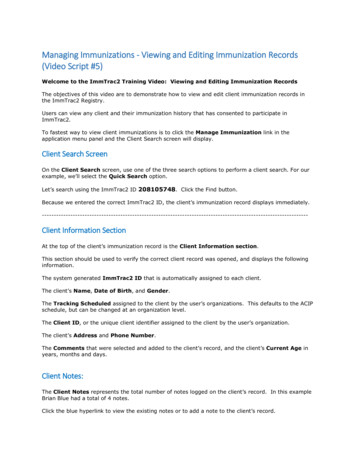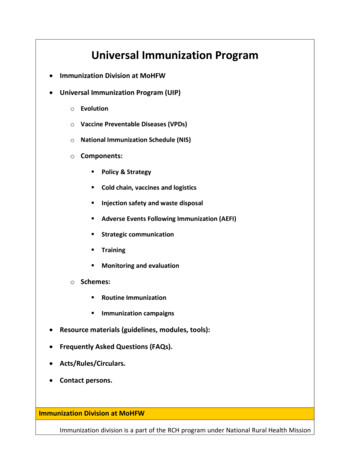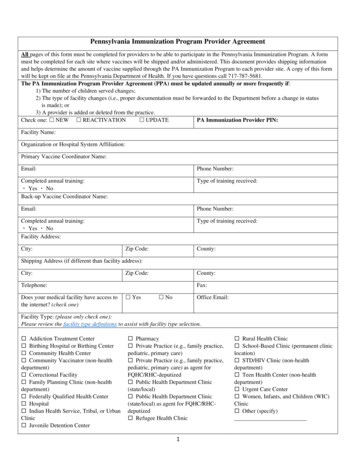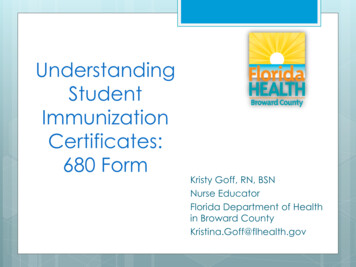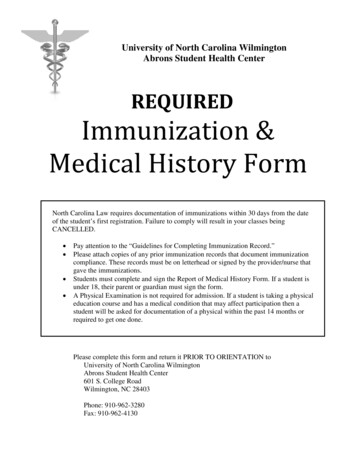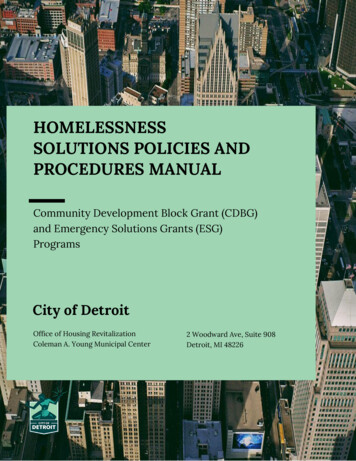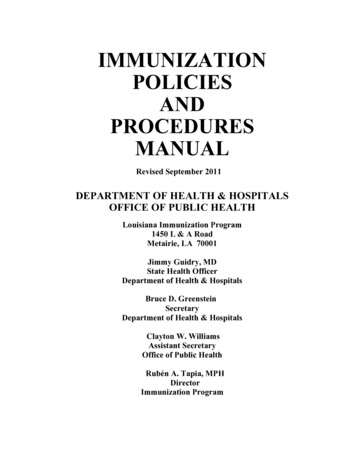
Transcription
IMMUNIZATIONPOLICIESANDPROCEDURESMANUALRevised September 2011DEPARTMENT OF HEALTH & HOSPITALSOFFICE OF PUBLIC HEALTHLouisiana Immunization Program1450 L & A RoadMetairie, LA 70001Jimmy Guidry, MDState Health OfficerDepartment of Health & HospitalsBruce D. GreensteinSecretaryDepartment of Health & HospitalsClayton W. WilliamsAssistant SecretaryOffice of Public HealthRubén A. Tapia, MPHDirectorImmunization Program
This Immunization Manual is dedicated to theImmunization Consultants, Public Health Nurses, Clerks,Vaccines for Children providers in recognition of theiroutstanding achievement in improving immunizationcoverage rates of Louisiana children.Rev. Sept 20112
TABLE OF CONTENTSI. POLICY AND GENERAL CLINIC POLICYPURPOSE . 5POLICY ON CLINIC SCHEDULING . 6POLICY ON PUBLICITY FOR IMMUNIZATION ACTIVITIES . 8POLICY ON EDUCATIONAL ACTIVITIES (HEALTH EDUCATION). 9POLICY ON CHECKING IMMUNIZATION STATUS OF ALL CHILDREN . 10POLICY ON MAXIMIZING TIME SPENT WITH PARENTS. 11POLICY ON ASSISTANCE TO FOREIGN TRAVELLERS . 13II. POLICY REGARDING CLINIC ORGANIZATIONPROTOCOL FOR IMMUNIZATION CLINIC ORGANIZATION . 14ORDERING OF IMMUNIZATION SUPPLIES . 17VACCINE STORAGE REQUIREMENTS . 20POLICY ON POWER OUTAGES . 23HANDLING OF VACCINE IN THE CLINIC AREA. 25POLICY ON TRANSPORTING VACCINE . 27POLICY ON EXPIRATION OF VACCINES AND BIOLOGICS . 29POLICY ON VACCINE TRANSFERS . 30POLICY ON VACCINE USAGE AND INVENTORY . 33III. GENERAL POLICY REGARDING IMMUNIZATIONVACCINE ADMINISTRATION RECORD AND VFC PATIENT ELIGIBILITY SCREENING RECORD. 40POLICY ON ROUTE OF ADMINISTRATION . 42TECHNIQUES FOR ADMINISTRATION OF INJECTIONS. 43POLICY ON INFORMING PARENTS OF POTENTIAL VACCINE REACTIONS . 48REPORTING OF ADVERSE VACCINE REACTIONS . 49SIMULTANEOUS ADMINISTRATION OF VACCINES . 51MIXING VACCINES . 52CHILDREN WITH INTERCURRENT ILLNESS. 53POLICY ON IMMUNIZATIONS OF HIV-INFECTED INDIVIDUALS . 54POLICY ON IMMUNE GLOBULIN, BLOOD PRODUCTS AND ROUTINE VACCINATION . 55POLICY REGARDING UNRULY AND RESISTING CHILDREN. 56RECOMMENDED HANDLING OF THE RESISTING CHILD . 57EMERGENCY PROTOCOLSPOLICY ON THE MANAGEMENT OF EMERGENCY REACTIONS . 58PROTOCOL ON VACCINE REACTIONS AND THEIR MANAGEMENT . 59CARDIAC ARREST PROTOCOL . 62ANAPHYLAXIS PROTOCOL. 63PROTOCOL FOR BRONCHOSPASM . 67PROTOCOL FOR RASH AND URTICARIA . 68PROTOCOL FOR DIZZINESS AND FAINTING . 69EMPLOYEE VACCINATION POLICY . 71IV. OPH PROGRAM VACCINE POLICIESVACCINE SCHEDULES . 77LOUISIANA IMMUNIZATION REQUIREMENTS FOR STUDENTS - R.S.17:170 . 80POLICY ON ISSUANCE OF UNIVERSAL CERTIFICATE FOR SCHOOL/CHILD CARE . 82Rev. Sept 20113
TABLE OF CONTENTS (CONTINUED)GUIDELINES FOR EXCLUSION FROM SCHOOL OR DAYCARE . 83POLICY ON IMMUNIZATION RECORDS UTILIZING LINKS . 84SCHOOLS OF HIGHER LEARNING IN LOUISIANA . 85POLICY ON DISEASE REPORTING . 86V. POLICY REGARDING SPECIFIC IMMUNIZATIONSPOLICY ON MEASLES VACCINATION . 87PROTOCOL FOR MEASLES RE-VACCINATION. 88CHRONOLOGY OF MEASLES VACCINE . 89POLICY ON POST-EXPOSURE TREATMENT FOR MEASLES CONTACTS . 90POLICY ON MUMPS VACCINATION . 92POLICY ON RUBELLA VACCINATIONS . 93POLICY ON POLIOMYELITIS VACCINATION . 94POLICY ON POLIO SCHEDULES AND RECOMMENDATIONS . 95POLICY ON THE ADMINISTRATION OF HAEMOPHILUS INFLUENZAE TYPE B . 97POLICY ON HEPATITIS A VACCINATION .100ADMINISTRATION OF IMMUNE SERUM GLOBULIN (ISG) . 103POLICY ON UNIVERSAL HEPATITIS B VACCINATION.104ANTEPARTUM PROGRAM FOR HEPATITIS B SCREENING AND PREVENTION . 106POLICY ON THE IMMUNIZATION OF HIGH-RISK CONTACTS . 111POLICY ON VARICELLA AND MMR-VAR COMBINATION VACCINATION . 118POLICY ON DTAP, DT, TD AND TDAP VACCINATIONS . 121POLICY ON PNEUMOCOCCAL CONJUGATE VACCINE (PCV). 124POLICY ON PNEUMOCOCCAL POLYSACCHARIDE VACCINE (PPSV23). 129POLICY ON INFLUENZA VACCINE. 131POLICY ON THE IMMUNIZATION OF ADOLESCENTS . 135POLICY ON IMMUNIZATION OF HIGH RISK ADULTS WITH HEPATITIS VACCINE . 136POLICY ON MENINGOCOCCAL (GROUP A, C, Y AND W-135) VACCINATION . 139POLICY ON LIVE, ORAL ROTAVIRUS VACCINE . 140POLICY ON HUMAN PAPILLOMAVIRUS (HPV) VACCINE . 142POLICY ON ADMINSTRATION OF RABIES VACCINATION . 144POLICY ON USAGE OF COMBINATION VACCINES . 149VI. MISCELLANEOUS IMMUNIZATION INFORMATIONPRE-SCHOOL AND SCHOOL IMMUNIZATION REQUIREMENTS.153ACCELERATED SCHEDULE FOR SHOTS FOR TOTS BY ONE . 154PROCEDURES FOR VACCINE PROTECTION AND DISASTER PREPAREDNESS . 156FOUR DAY GRACE PERIOD - IMMUNIZATION SCHEDULE . 162IMMUNIZATION GUIDELINES FOR DISPLACED CHILDREN - POST - NATURAL DISASTER . 163CHECK YOUR VIALS: IS IT TDAP, DTAP or Td.165VACCINES FOR CHILDREN (VFC) DISCREPANCY OR MISUSE POLICY.166FOREIGN-BORN PERSONS AND IMMUNIZATIONS -- FREQUENTLY ASKED QUESTIONS.170SPECIAL CONSIDERATION FOR EMERGENCY PROTOCOL TO BE FOLLOWEDIN A NON-MEDICAL FACILITY.199VACCINATION OF HEMATOPOIETIC CELL TRANSPLANT RECIPIENTS. 200Rev. Sept 20114
PURPOSEOne of the major goals of the Office of Public Health (OPH) is to promote health through the prevention ofillness and death. Immunization has proven to be a safe and effective way of preventing the morbidity andmortality of many infectious diseases. The low cost and high efficacy of vaccination ensures that every dollarspent on vaccination is repaid many times over because of reduced hospital costs, in addition to lives thatremain productive. Accordingly, the Office of Public Health has made immunization of every child inLouisiana a high priority. The Louisiana Legislature supported this philosophy by requiring immunizationfor all children in schools and childcare facilities in Louisiana.Immunization is a complicated subject. It requires knowledge about numerous vaccines, preparation for therare side effects, and effective communication with people. This immunization manual is published so thatOffice of Public Health personnel will have clear guidelines regarding immunization policies for clinicsconducted by OPH, and will always have access to the latest information about vaccination. The authorshave organized this section of the manual into:I.Philosophy and General Clinic PolicyII.Policy Regarding Clinic OrganizationIII.General Policy Regarding ImmunizationIV.Policies Regarding Specific ImmunizationsWe hope that it will provide quick and simple answers to the many questions that arise during immunizationclinics.Rev. Sept 20115
POLICY ON CLINIC SCHEDULINGPolicy:1.The scheduling of times and places for immunization clinics is a local and regional responsibility.2.Clinics shall be held at times and places that effectively promote vaccination and make efficient useof staff time and facilities.3.Scheduling shall be periodically reviewed to ensure that the schedule still fulfills program goals.4.During power outage and/or Louisiana Immunization Network for Kids Statewide (LINKS) systemfailure individuals should bring their personal immunization record to the clinic. Individuals withouttheir personal immunization record shall be given age appropriate vaccinations.5.Individuals being served at the time of power or system failure would have their vaccinationsrecorded in the Vaccine Administration Record, Vaccine for Children (VFC) Patient EligibilityScreening, AND Registry Authorization (Imm-5,Revised ). A copy of the record brought by theparent should be attached to the Imm-5 form. Provider should be aware that this is the only form thatis mandated by the Vaccine Injury Act of 1986. For further information read pages 30-31 of thismanual. To obtain a blank copy of the VFC VAR form in LINKS, sign-onto LINKS registry, go to‘REPORTS’ and scroll down to ‘STATE REPORTS’ and then select ‗VFC VAR BLANK’ toprint copies.6.A copy of the patient‘s updated immunization record will be mailed no later than a week after systembecomes operational.Rationale:The goal of the OPH - Immunization Program is to provide immunization services and education in the mosteffective and efficient manner. Effective immunization clinics promote high vaccination coverage levels bybeing held in locations and at times that provide access to the individuals and families who need vaccinations.Effective clinics promote vaccination by providing prompt service in a pleasant atmosphere. Efficientimmunization clinics correctly vaccinate a maximum number of children with limited staff time andresources. Because of tremendously varying conditions in this large and diverse state, immunization clinicsare best scheduled by staff most familiar with local conditions using clinic audit results and assessments toidentify local needs.Clinic scheduling to promote access is encouraged. Clinics are expected to provide immunizations to walk-inclients during all business hours whenever possible. Clinics are also encouraged to provide regularlyscheduled extended hours on weekends or evenings. This improves access for working families and canimprove immunization coverage.Rev. Sept 20116
Rev. Sept 20117
POLICY ON PUBLICITY FOR IMMUNIZATION ACTIVITIESPolicy:Local and regional staff will have primary responsibility for public information regarding parish health unitimmunization clinics as prescribed by the Department of Health and Hospitals/Office of Public Health(DHH/OPH) policy. Assistance may be requested from the Immunization Program Office in New Orleans.Rationale:Local public events such as immunization clinics are best publicized through the local media and othersources of local public information through the DHH Office of Public Health Media CommunicationsSection. In addition to the local news media (newspaper, radio and TV, if available), there are many sourcesof local public information such as school, church, and voluntary organizations. OPH staff should maintainan effective liaison with these groups to ensure adequate public knowledge of local OPH activities. Publicinformation campaigns are also carried out by the state "SHOTS FOR TOTS" activities and the United StatesCenters for Disease Control and Prevention.Rev. Sept 20118
POLICY ON EDUCATIONAL ACTIVITIES (HEALTH EDUCATIONIN IMMUNIZATION CLINICS)Policy:1.A concentrated effort shall be made by local and regional offices to provide health education andinformation regarding immunization at every opportunity.2.The design and implementation of health education programs is the responsibility of local andregional personnel. Assistance and materials may be requested from the Immunization Program inNew Orleans.3.On a regular basis, every regional and parish health unit will review its efforts in health education,and strive to improve this component of the immunization program.Rationale:Education strengthens a patient‘s / parent‘s ability to act on their own behalf in the prevention of disease, bygiving the patient or parent knowledge-- the most powerful of all tools. Health education is a dynamicprocess, which enlists the many skills, interests, and the resourcefulness of the persons involved. Healthinformation is a passive approach using printed or audio-visual materials. There are many opportunities topresent educational material regarding immunization.Some examples are:Pre-Clinics:During Clinic:After Clinic:Rev. Sept 2011Media publicity, activity in schools, speakers for community groups.1.In the waiting room; coloring books, posters for walls, pamphlets fordistribution, use of audio-visual presentations such as immunization videotapes and small conferences.2.With the nurse: this is the best time for person-to-person educationalprocess (health education); the potential benefits are highest during thistime.Printed information on immunizations and side effects given to parents; availability ofpersonnel in the event if problems or questions arise.9
POLICY ON CHECKING IMMUNIZATION STATUS OF ALL CHILDRENRECEIVING SERVICES THROUGH THE HEALTH DEPARTMENTPolicy:The Immunization status of all children receiving services through the health department shall be reviewed atevery visit; this includes private care WIC patients.The following steps should be taken in regards to determining immunization status and immunizing privatecare WIC patients in the parish health units:1. Each private care WIC patient‘s status of immunization shall be checked at each visit by use of theLINKS immunization registry or assessing the patient‘s immunization record. The immunization recordshall be checked to see if it has been entered in the LINKS registry with documentation of the mostcurrent immunizations received. Encourage the parent or guardian to bring the immunization record ateach clinic visit.2. If the patient has no immunization record, urge the parent or guardian to obtain one from the privatephysician or obtain a signed Release of Information form that allows for the exchange of immunizationrecords between the private physician and the Health Department.3. For the child who is up to date, the parent or guardian should be so informed, and also told when the nextimmunizations are due.4. For the child who is behind in the immunization schedule, the parent or guardian should be so informed,and offered the option of having the immunizations at the parish health unit at that visit, or seeing theprivate physician as soon as possible to have the immunizations.5. If the child is not present at the visit to the parish health unit, the parent or guardian should be urged tohave the child immunized as soon as possible at the parish health unit or at the private physician‘s office.For further information on the linkage of Immunization and WIC services see MMWR 1996; 45(10): 217-218or www.cdc.gov/mmwr/preview/mmwrhtml/00040658.htm on the internet.Rev. Sept 201110
POLICY ON MAXIMIZING TIME SPENT WITH PARENTSDURING IMMUNIZATION CLINICSPolicy:1.It is the policy of the Office of Public Health to maximize the time that parents/patients and thehealth professional spend together.2.The health professional will continuously review practices and procedures so that adequate time maybe spent with each parent/patient, according to specific circumstances involved.Guidelines:The following guidance is provided to help accomplish this policy of using time to maximum mutualadvantage.The Setting:a)Establish the setting in the most efficient manner possible, assuring that needed supplies and theirlayout are completed before patients enter the clinic area.b)Establish a setting conducive to interaction by eliminating to the highest degree possible, otheractivities, conversations, and non-essential personnel from the immediate clinic area.Interaction-System:a)A routine sequence of actions that is followed rigorously should be developed by each healthprofessional to facilitate problem identification and to use the time available to educate the patientabout the importance of keeping their children immunized on schedule.Rev. Sept 201111
POLICY ON MAXIMIZING TIME (cont.)Health Education:a)Develop a systematic approach to allow inclusion of time to provide health education during allparent/patient contacts.b)The following sequence of health education may be useful:1.Review importance of immunization and how immunizations work.2.Review details of specific vaccines including important information statements or vaccineinformation pamphlets and other materials presented in writing.3.Review importance and need for boosters, and remind parents/patients toreturn for the next immunization appointment.4.Remind parents/patients to report an adverse event following immunization.c)Continuously review and assess the many ways in which a health professional can make maximumuse of time spent with parent/patient during the immunization process.d)Continue to search for the desirable flexibility in individual approach to allow fulfillment of thispolicy.Rev. Sept 201112
POLICY ON ASSISTANCE TO FOREIGN TRAVELERSPolicy:The Office of Public Health provides the following services for international travelers:1.Advice to travelers, or their physicians, on the need for certain immunizations, biologics,medications, or other precautions that may be necessary to maintain their health when travelingoverseas (Refer to the yellow book – CDC Health Information for International Travel – currentversion to provide foreign travel information specific to visiting countries or check the CDCwebsite).2.Clinics conducted by the Office of Public Health shall not provide immunizations or biologics tointernational travelers except those designated as International Travel or yellow fever vaccinationcenters with the exception of bringing children ―up-to-date‖ for their normal childhoodimmunizations and giving adults Td boosters as appropriate for their immunization status. Onlythose health unit clinics designated as approved yellow fever vaccination centers shall provideyellow fever vaccinations.Guidelines:Inquiries made to the regional office or parish health unit for information on requirements andrecommendations involving immunizations for international travel should be referred to the InfectiousDisease Epidemiology Section at (504) 219-4563 or visit the Centers for Disease Control and Preventionwebsite under TRAVELERS’ HEALTH at http://www.cdc.gov.Persons requesting immunizations not included in the above policy statement (i.e., typhoid, immune serumglobulin, polio vaccine for adults) shall be referred to their private physicians. Persons needing yellow fevervaccinations shall be referred to the nearest yellow fever vaccination center.Rev. Sept 201113
PROTOCOL FOR IMMUNIZATION CLINIC ORGANIZATIONObjectives:1. To assure that all needed equipment, orders, and forms are readily available in the clinic room.2. To make recommendations that will assist OPH staff in providing immunizations to Louisiana children inan efficient and effective manner.EQUIPMENTEDUCATIONAL MATERIALSSyringes – NeedlesPamphletsAlcohol sponges (cotton balls)PostersDry cotton balls"Guide to True/False Contraindications toVaccination"Band AidsEmergency TrayVaccinesIce chest w/ ice packs for clinic area vaccine storageSharps disposal containerAlcohol-based hand cleansersSpaceWaiting AreaClinic RoomForms/OrdersCurrent Important Information Pamphlets/StatementsImmunization Policy Manual, Access to: "PediatricRed Book", "Control of Preventable Diseases inMan", and current copy of ―Epidemiology &Prevention of Vaccine Preventable Diseases‖course book.Orders from Medical ConsultantsEmergency Management protocolImmunization Record entry in LINKsPatient Education MaterialsChild's Immunization RecordsRev. Sept 201114
PROTOCOL FOR IMMUNIZATION CLINIC ORGANIZATION (cont.)StaffSufficient staff is needed to cover expected attendance at clinic and knowledge in the handling of emergencyreactions to vaccine.Procedure1.Assess needs - pre-plan and estimate how many children will attend the immunization clinic.2.Publicize the clinic schedule.3.Coordinate with school nurses.4.Order enough vaccine and supplies for a one month period.5.Set up the immunization site with sufficient vaccine (properly stored), related supplies, and withprovisions for safe waste disposal.6.Assign appropriate personnel to clinic activities. See Chart below for suggested duties andresponsibilities.Suggested Duties/ResponsibilitiesClerkVolunteerPHN and/or LPNGreeting patients on arrivalDetermining purpose of visitPulling Old RecordsMaking New Records/LINKs data entry*Giving Information Statements or VaccineInformation PamphletsReview Information Statements or VaccineInformation PamphletsReviewing Immunizations NeededProviding Pre-Immunization EducationInterviewing Individual PatientsReviewing ContraindicationsAdministering ImmunizationsProviding Post-Immunization & Side-EffectsInformationGiving Return AppointmentsFilling Out Patient LINKs RecordCompleting Nurses Time Report*Note: In some cases it will be necessary to determine which specific immunizations are neededbefore important information statements or vaccine information pamphlets are handed out. In thosesituations, a nurse will instruct the clerk as to the appropriate information statements or vaccineinformation pamphlets needed.Rev. Sept 201115
PROTOCOL FOR IMMUNIZATION CLINIC ORGANIZATION (cont.)The nurse in the clinic shall be responsible for:1.Administering all of the appropriate immunizations;2.Instructing parents about and assisting in positioning or restraining of children;3.Maintaining aseptic technique during clinic;4.Assuring that the vaccine cold chain (use of ice packs) is maintained;5.Proper disposal of syringes, needles and other waste supplies after clinic;6.Explaining any possible side effects and recommendations regarding immunizations received.RECOMMENDATIONS1.If two nurses are giving immunizations, arrange separate or screened areas for each nurse to provideprivacy for discussion and vaccine administration.2.Have one nurse complete the entire sequence of events for a given patient, i.e., contraindications,precautions, questions/answers, immunizations, reactions, and next appointment.3.Take advantage of waiting room time to provide educational activity.4.When possible as parent/child leave immunization room/space, have the clerk or a volunteer send inthe next person (this may help maximize efficiency of nursing time).5.If there is an obvious communication problem due to a language barrier and someone is available inthe office that can help, bring them into the setting early to avoid disruption and confusion on the partof the parent or child as to what is going to happen. Contact the Language Line for assistance withlanguage interpretation (e.g., Latino/Hispanic population) at 1-800-367-9559.Rev. Sept 201116
ORDERING OF IMMUNIZATION SUPPLIESPolicy:1.2.Each parish health unit/clinic facility must have a designated nurse (preferably the supervisory nurse)whose responsibilities include:a)maintaining adequate inventories of vaccines and related suppliesb)ordering/receiving vaccines and related supplies and compare vaccine received with vaccineinvoicec)proper storage of vaccines and related supplies immediately upon arrivald)checking expiration dates and taking appropriate action with outdated vaccines/supplies andany discrepancies with vaccine shipment orderThere must be a designated alternate nurse (in offices with more than one nurse) to serve when thedesignated nurse is absent from duty. It is recommended that a protocol be posted for all staffregarding vaccine deliveries and whom to contact regarding vaccine shipments in conjunction withstorage and handling requirements.Procedure:The designated nurse is responsible for maintaining the designated ordering schedule for vaccines andsupplies based on past usage, anticipated need, and storage capability. The order submitted by the parishhealth unit should allow for at least two weeks between submission of the requisition and receipt of thematerials.The designated nurse will compile a list of all needed vaccines on one Vaccine Order Form. All otherbiologics and supplies, such as PPD, infant formula, syringes, etc., should be ordered using the form AC-23.AC-23 requisitions will be signed and forwarded to the Pharmacy for processing.The procedure for ordering is as follows:1)A Vaccine Order Form must be used to order all vaccines.2)The AC-23 requisition must be used when ordering other biologics and supplies.3)The Vaccine Order Form should be completed by the nurse/clerk and must be signed by thenurse supervisor. The AC-23 requisition should be completed by the nurse/clerk andapproved by the cost center manager.4)The parish health unit or branch offices should mail or fax (504-838-5255) the VaccineOrder Form and the AC-23 (Immunization supplies only) directly to the ImmunizationProgram in New Orleans. The parish health unit should retain a copy of the Vaccine OrderForm or the AC-23 until the order is received.5)The Immunization Program will approve the requisition after it is received and then submitthe order to McKesson Specialty Distribution for processing and packing.
This immunization manual is published so that Office of Public Health personnel will have clear guidelines regarding immunization policies for clinics conducted by OPH, and will always have access to the latest information about vaccination. The authors have organized this section of the manual into: I. Philosophy and General Clinic Policy II.
